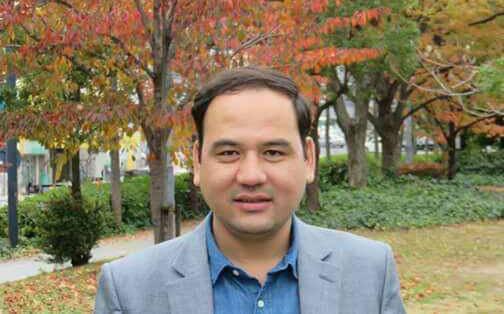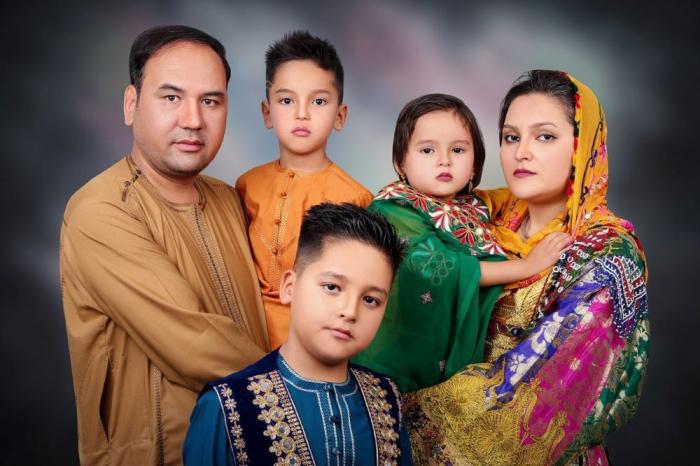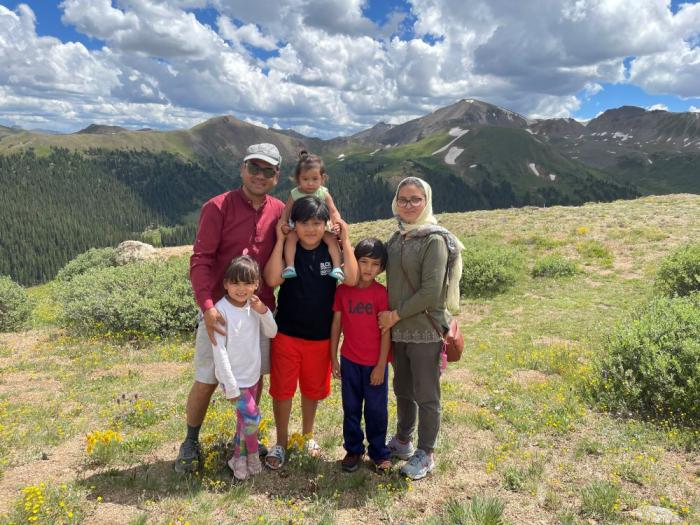Opening doors through making maps
Editor’s note: Denver Water celebrates and embraces the cultures around us that shape who we are today.
Just like our customers, Denver Water employees have diverse backgrounds, and we’re proud of our rich cultural diversity that reflects the 1.5 million people we serve.
Here’s the situation: A family faces the challenging decision to leave their home, friends, jobs, town and country and start their lives over in a new country.
For Mukhtar Mirzaei, this is a decision he has had to make before. Not once, not twice — but three times.
Mirzaei is a survey technician at Denver Water, where he is immersed in data to make maps for engineering and design projects to deliver water.
When he lived in his home country of Afghanistan, Mirzaei was a cartographer who surveyed and collected data. His work wasn’t for a single project. It was for the entire country.
Move No. 1
Born in Afghanistan’s capital city Kabul, Mirzaei and his family left their homes and their lives when he was only 4 years old.
“The Soviet Union had invaded Afghanistan and there was war, so my family decided to move to Iran where we would be safe,” Mirzaei said.
That was move No. 1.
With his parents and six siblings, Mirzaei and his family stayed in Iran for almost two decades. Mirzaei said he felt like an outsider during his childhood, and it was often difficult.
Learn more about the people who deliver water to 1.5 million people.
“When I was a kid in Iran, I wasn’t like the other kids and felt different,” Mirzaei said. “I felt singled out by friends and by teachers at school. Some of those memories aren’t good.
“Sometimes I didn’t feel like I belonged anywhere. I was Afghan, and I couldn’t live in Afghanistan. I grew up in Iran, and I wasn’t Iranian. Iran didn’t feel like home. Afghanistan was home,” he said.
During the years when Mirzaei lived in Iran, his home country was in a state of constant turmoil.
After Afghanistan’s war with the Soviet Union, civil war broke out and lasted for over a decade. This also included political upheaval that brought the Taliban to control, and eventually resulted in military strikes from other countries after the 9/11 attacks in New York City in 2001.
Many areas in Afghanistan were partially destroyed, including parts of Kabul, Mirzaei’s hometown.
Move No. 2
When the Taliban was removed from power in 2001, opportunities began to open for many Afghans to return to their home country. Mirzaei and his family were able to go back.
“I basically left Afghanistan before kindergarten and went back to Afghanistan at the end of university,” Mirzaei said.
That was move No. 2.
“My father was very eager to get back to Afghanistan, and my family told me they would understand if I didn’t want to go,” Mirzaei said. “I told them, no, I want to because we all wanted to come back. It felt good to come home.”
Because he was a small child when his family immigrated to Iran, he didn’t remember what Afghanistan had been like before the wars.
“My older siblings were already married, so we had family and cousins there, as well as a home to go back to,” Mirzaei said.
Mirzaei said that part of the transition home was easy because they were with family and didn’t have language barriers to overcome, unlike what they’d experienced when his family moved to Iran.
Yet returning to Afghanistan was challenging. Infrastructure was lacking, and the family had to pump water from wells and power their house with a generator.
With time, Mirzaei said their situation improved, day by day.
Career steps and the first map
With his bachelor’s degree in cartography, Mirzaei found a job in his field. He went to work in Afghanistan’s Office for Geodesy and Cartography, the department responsible for surveying and mapping Afghanistan. (Read about geodesy here.)
“Mapping projects for the country were managed from the capital in Kabul, and at that time, all of our maps were hard-copy maps,” Mirzaei said. “We had so many people coming back to Afghanistan and new people coming in, and everyone needed maps.”
One of Mirzaei’s first projects was to convert hard copy maps with original data into digital maps.
“I basically helped make the first digital map of Afghanistan,” he said.
Mirzaei worked with the Geodesy and Cartography office for several years. Then more international companies with additional resources and staff began reconstruction projects in Afghanistan.
That meant more opportunities for technical experts like Mirzaei, who continued to build his skills. It also opened the door for higher paychecks.
“After a while, the companies paid more than the government,” Mirzaei said. “I wanted to increase my salary, so when a job opened with an American construction company helping to rebuild Afghanistan’s infrastructure, I joined that company.”
Get information about careers at Denver Water.
Taking that new job became one of the most important decisions Mirzaei would make in his career — and his life.
The construction company worked under the Army Corps of Engineers on projects that supported Afghanistan’s army and police. Mirzaei worked with that company for the next four years, traveling throughout Afghanistan and as a survey crew chief.
When he was ready for the next professional challenge, Mirzaei left the construction company and took a job leading the survey and mapping department for Kabul New City, a proposed internationally supported urban redevelopment project to build a new capital on lands northeast of the existing capital.
Mirzaei worked on Kabul New City for about four years before returning to the government with the Ministry of Urban Development for Afghanistan, in leadership as a departmental director.
Still passionate about education, Mirzaei went to Japan twice for further training and education on transportation, GIS and urban development. He received a master's degree in urban planning and began studying English at the American University in Kabul. He taught urban planning and surveying at a private university for several years.
And then, life in Afghanistan began to change.
Move No. 3
For years, Afghanistan had been dealing with political and military instability. Some portions of the country were governed by international coalitions led by the United States, while others remained in control of the Taliban. Between 2009 and 2015, the Taliban gained power across the country.
This situation brought security concerns for Mirzaei and his family. The university where he studied English became a target.
Driving home from university one day, Mirzaei heard a news report that there was an attack on the university. He had left about five minutes before it happened.
Another day, a truck filled with explosives detonated on a street, killing over 100 people and destroying the buildings around the truck — 15 minutes after he had walked by.
“Kabul didn’t feel safe anymore,” Mirzaei said.
Tips and tricks to conserve water delivered to your inbox. Subscribe to TAP.
Between 2014 and 2015, Mirzaei became eligible to apply to immigrate to the United States, thanks to his former job with the construction company, a contractor through the Army Corps of Engineers.
“Initially, only translators had the opportunity to immigrate to America under this special visa,” Mirzaei said. “Then I found out the option was expanded to all contractors, and I was included. It was such unexpected news.”
With conditions in the country continuing to deteriorate, Mirzaei and his family made the difficult decision to leave Afghanistan for the United States.
It wasn’t an easy process.
Mirzaei traveled to Europe and applied for American citizenship there. Eventually, in 2017, he and his family received visas and tickets to fly to Colorado where they had friends.
“When I got our papers, the immigration officer said, ‘Welcome to the USA,’” Mirzaei said. It was an unforgettable moment for him.
See Denver Water surveyors map the bottom of Dillon Reservoir.
It was a long and stressful journey for Mirzaei and his family to get to the United States.
“We saw people who lost their visas if a background check didn’t clear and knew of people who had visas suddenly canceled when they were at the airport getting ready to board their flights,” Mirzaei said.
To get to Denver, the family had layovers in Dubai and Boston.
One of their children was only 9 months old when they left, and during their travels, she became ill.
“Our daughter was crying and had a fever,” Mirzaei said. “We had to report her illness at the airport.”
Because many immigration policies prohibit ill people from entering a new country, Mirzaei feared they wouldn’t be allowed to board their connecting flights.
“We were waiting at the gate, and they sent us to the front of the line,” Mirzaei said.
Nervous, Mirzaei and his wife met an immigration officer and a doctor waiting to examine their daughter.
After a temperature check and physical, Mirzaei and his family were cleared to travel.
“Instead of being told we couldn’t get on the plane, they gave us priority boarding. They helped us because our baby was a little sick,” Mirzaei said.
Based on what Mirzaei had heard about the typical immigration experience, he wasn’t expecting these accommodations from immigration and customs officials.
“It was such a kindness.”
Settling into a new life
Life in Colorado has brought Mirzaei and his family many new opportunities. They welcomed another child and were able to buy their first house.
A few years ago, when he heard a former colleague talking about going camping, he had questions.
“I didn’t even know what camping was,” Mirzaei said. “Then my work friend gave us gear, so we have tents and equipment. Now my family loves to go camping and out on picnics.”
Mirzaei said he is relieved his family moved when they did; if they had waited, they could’ve lost the opportunity.
For Mirzaei, one of the best things about Colorado is that his children are happy, relaxed and feel like they belong, something he always wanted for them. His oldest child is proud to be bilingual.
“I’m very glad we chose to move to Colorado, where my children can study in a good education system and my family has a good place to live with a good quality of life,” Mirzaei said.
Mirzaei has spent a lifetime embracing learning, a trait he says helped him get his current job at Denver Water, where he most appreciates equality and teamwork.
“Denver Water is the best place to work. I’m a strong part of a solid team, I have job security, and very friendly colleagues in a great work environment,” Mirzaei said.
“I know I was hired based on my technical qualifications and experience. I’m not feeling like a foreigner here, and that means a lot to me. I’m very satisfied here.”




